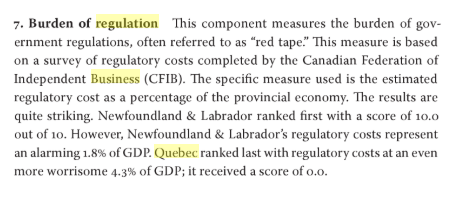This morning, my home province of Quebec was reported to have 5th highest rate of COVID deaths per 1M. As I keep explaining, dealing with pandemics needs a) institutional flexibility; b) strong informal institutions; c) federalism. Quebec has little of those 3 #econtwitter #polqc
About A): Pandemics are shocks that require people to reallocate resources from W-X to Y-Z purposes. Reallocation is costly. Some of the costs are natural and part of the game. Other costs are regulatory and government imposed.
In indicators of business regulation such @FraserInstitute EFNA& #39;s component for regulation, Quebec fares *very poorly* relative to other provinces.
Two things happen from A). The first is that the costs to individuals of the shock lasts longer and goes deeper. The second (a product of 1st) is that the costs incite people to be less willing to accept lockdowns.
This reduces the effectiveness of governmental efforts to deal with the pandemic. This complements the point that Mesnard and Seabright made in Journal of Public Economics regarding efficacy of quarantines https://www.sciencedirect.com/science/article/pii/S0047272709000644?casa_token=NLQReb9EOGQAAAAA:nZS_hrCKlB8WkQD5-bi89LeCkY3UUfbBqanZoVCEpopLMwR0l-pfxJnaZxRt_rA8dtrm-04_Hg">https://www.sciencedirect.com/science/a...
Your initial level of institutional flexibility to dealing with shocks will determine the effectiveness of any efforts in the face of a shock.
Regarding B) Say what you want about the "Karens" but ostracism is part of our evolutionary nature and its actually a pretty efficient tool in the provision of public goods and the management of externalities
https://psycnet.apa.org/buy/2001-16969-001">https://psycnet.apa.org/buy/2001-... https://idp.springer.com/authorize/casa?redirect_uri=https://link.springer.com/article/10.1007/s11127-018-0573-x&casa_token=Ngb5gjnjYa0AAAAA:jrK91o6kftMSZ4x0Bbm3q-rsP5I1HERzJ_MVj2J-ry92aZQJGO6MS4vLjwYXQexZiDqMTLzuxSTb9zAn">https://idp.springer.com/authorize...
https://psycnet.apa.org/buy/2001-16969-001">https://psycnet.apa.org/buy/2001-... https://idp.springer.com/authorize/casa?redirect_uri=https://link.springer.com/article/10.1007/s11127-018-0573-x&casa_token=Ngb5gjnjYa0AAAAA:jrK91o6kftMSZ4x0Bbm3q-rsP5I1HERzJ_MVj2J-ry92aZQJGO6MS4vLjwYXQexZiDqMTLzuxSTb9zAn">https://idp.springer.com/authorize...
Ostracism, strangely enough, requires high levels of social trust to police bad behavior. Quebec is an exceptionally low-trust society relative to the rest of Canada. https://idp.springer.com/authorize/casa?redirect_uri=https://link.springer.com/article/10.1007/s12134-006-1010-4&casa_token=eQ405jSXc7wAAAAA:VPC48yQO8ikDAXqzN9z9d_jtF4-fNk-RFhxd-pxp_AYic6csnkZjs2CLGZWSJ3nSS5K3XWMq9uW6Kfao">https://idp.springer.com/authorize...
Because of that low level of trust, the effectiveness any form of "private policing" of socially-risky behavior is reduced. Basically, you want to have some Karens that stigmatize bad behavior through informal institutions such as reputations, etc.
Regarding the last (federalism), I have continually argued that in the fact of uncertainty about the situation, there needs to be a discovery process. That process requires experimentation. Experimentation is best served under federalism rather than 1-size-fits-all policies
In Quebec, cities (the lowest rung of government) are politically very weak and subservient to provincial government. Their weakness relative to the central (and by this I mean provincial government as health care is mostly managed by provinces) government prohibit experiments
Basically, Quebec (although this applies to other provinces as well) has a 1-size-fits-all policy. Combine this with the other bits and I am not surprised that Quebec fares poorly.

 Read on Twitter
Read on Twitter


